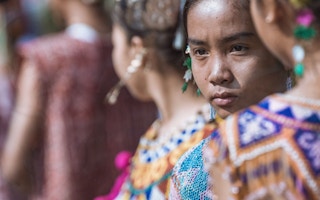The dominance of Western voices in the conversation about how to tackle the climate crisis has been a “disaster” for the climate movement, prominent author Amitav Ghosh said at an event on a just recovery from the Covid-19 pandemic.
To continue reading, subscribe to Eco‑Business.
There's something for everyone. We offer a range of subscription plans.
- Access our stories and receive our Insights Weekly newsletter with the free EB Member plan.
- Unlock unlimited access to our content and archive with EB Circle.
- Publish your content with EB Premium.
Too much of what is written and said about confronting climate change is the product of Western think tanks, and there are not enough Asian and African voices representing people who are most affected by the climate crisis, Ghosh said at the Just Recovery Gathering on Friday (9 April).
“Why is the voice of the woman who has to walk 10 miles for water not being heard more clearly? Why is the [climate crisis] always reduced to numbers and equations,” said Ghosh, who added that the discourse on climate change tends to have an “intimidating” air of expertise that excludes many people.
“It keeps people out — it keeps the young and people who don’t have that level of expertise out [of the climate debate],” said Ghosh.
The Indian author of The Great Derangement: Climate Change and the Unthinkable has argued that the West relies on experts to give people false hope in business-friendly “sustainable development” solutions such as biofuels and carbon capture technology to avert climate calamity.
“Asian and African farmers and fishermen have known for a long time that the climate is changing in a disastrous way. It’s very important to reintegrate these voices into the [climate] discourse,” he said.
“
There is no climate justice without social justice — and this starts by elevating global south voices.
Norly Mercado, Asia regional director, 350.org
Speaking to Eco-Business on the sidelines of the virtual event, Norly Mercado, Asia regional director of climate campaign group 350.org, the event organiser, said that to fight climate change, and achieve climate justice, those on the frontlines must be listened to.
“Global North countries who provide aid can’t presume to appear on someone’s land and start telling them what to do to save them. Firstly, these communities may not want to lead the same lives as you,” she said. “They have their own ways of life that they are true to. We must learn to respect and uphold the kind of lives and development that they have determined for themselves.”
The problems that indigenous peoples and rural communities are facing need to be heard, and so do their solutions to climate change, said Mercado, pointing out that these people have lived on their land for centuries.
“Conversely, the issues they face are usually brought in by outsiders who want to build fossil fuel infrastructure without their consent, or well-meaning people who misunderstand that indigenous people do not need to be saved or brought to what they might view as civilisation.”
“There is no climate justice without social justice — and this starts by elevating global south voices,” she said.
False solutions and a brighter future
Journalist and social activist Naomi Klein, author of books including This Changes Everything: Capitalism vs. the Climate, said that the climate movement needed to show that a just transition to a zero-carbon society will mean a more positive future than merely an alternative to “the apocalyptic breakdown you see in science-fiction movies.”
She said the fossil fuels industry had continually sold the story that if action is taken on climate, “you’ll lose your job, your life will be terrible,” but the reality of a just transition would be a tangible improvement to daily life, with free public transport, affordable housing, and fair access to clean energy among the potential benefits.
“A green job isn’t just a guy putting up a solar panel. It isn’t just the idea that we can lead the same high-consumption lives because we’re getting our energy from so-called green sources. It means that we’re valuing different things, living differently, and leading happier lives,” said Klein.
“
People didn’t miss shopping, they missed each other.
Naomi Klein, author and social activist, on Covid-19
Klein said that for the climate movement to succeed, it needed to show how people can experience a high quality of life outside of the capitalistic consumption cycle. She has written that through urban recreation, public art or being in nature, we can avoid the grind of overwork, and that the quality of life equates to personal prosperity and wealth accumulation.
There is a risk that people succumb to fear-based messaging from corporations that propose radical technology to curb climate change instead of changing the fossil fuels-based model on which modern living is based, she said. Klein took aim at tycoons like Microsoft founder Bill Gates, who have supported technology that would block the sun to address global heating.
“I don’t believe that hacking the sun is a more appealing solution than energy democracy, public housing, and a youth-led climate corps that will plant billions of trees, and give land back to indigeous people. This is a beautiful future we’re talking about, that is better than the present,” she said.
Klein said the threat of greenwashing corporations proposing outlandish climate solutions to maintain the status quo are real, “but they get their energy from our failure, our lack of ambition. What they’re proposing is dismal and terrifying. We don’t want to dim the sun.”
The Covid-19 pandemic has been a wake up call for what people really value in their lives, which could help bring about a just transition as people imagine a better future, Klein suggested.
“We have a short window before the runaway train called normal comes slamming back into our lives. We have a very vivid memory of what we did or did not miss. People didn’t miss shopping, they missed each other,” she said.










